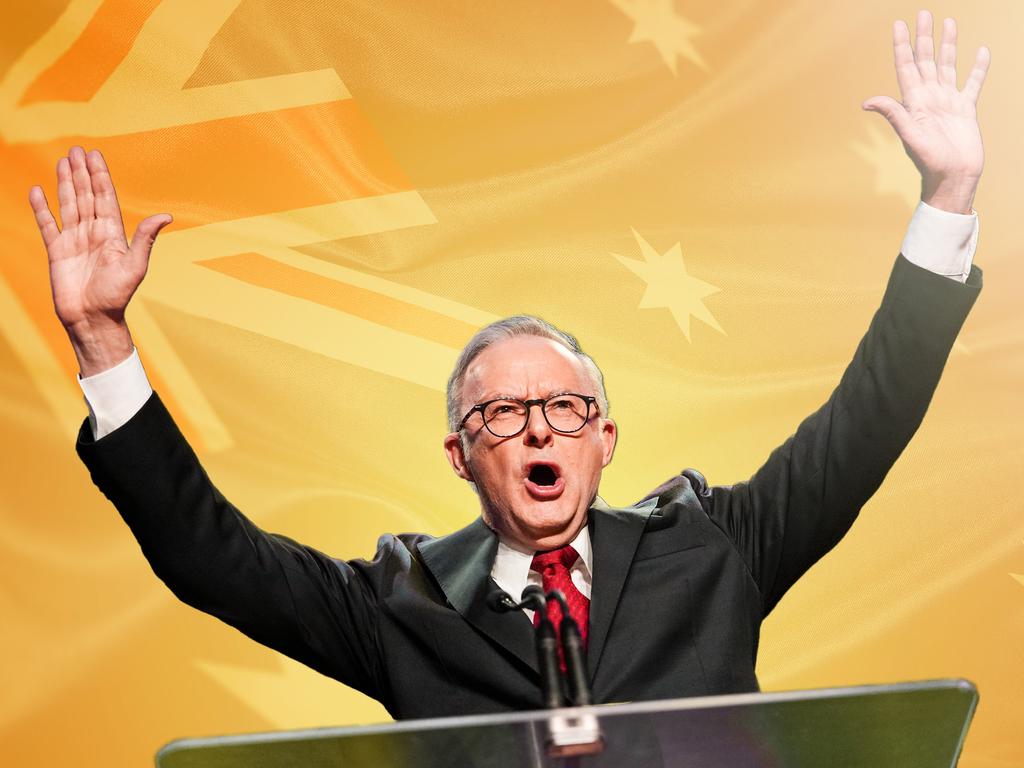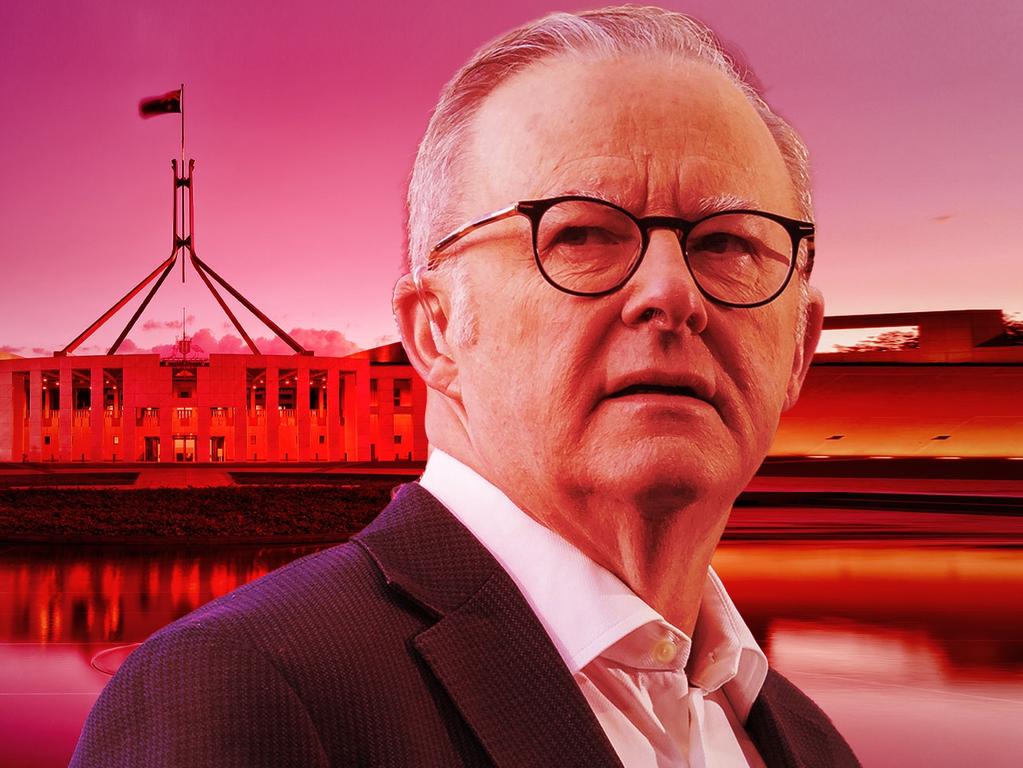
Jim Chalmers and Michele Bullock are confronted by the challenge of refreshing their stories about the economy and Australia’s future as the world’s menaces keep coming at us fast. The nation yearns for progress and stability, but people know in their bones we’re stuck in a rut, the old ways won’t do and our children may never attain the prosperity of the past.
In the wake of the manifold disruptions of the reform era, we settled for “do nothing”, which has, over time, brought on a stagnation in living standards. Many see that as a betrayal of our endowments: a whole continent, hardworking folk, reasonable rules, and systems that have faltered but are not broken.
The Treasurer and Reserve Bank governor are the pivotal figures in managing the new policy territory but they’ve exhausted their narratives; the former sits on political capital and time to make repairs to the budget and growth engine, while the latter is working towards monetary normal and institutional revival in an era of upheaval.
Technical expertise is necessary to craft policies and land them, but stories matter, too, not just for the aficionados or those placing bets for the whales of the interest-rate casino. They matter for communities at the forefront of change and to attain broad consent; Chalmers has the more pressing and difficult task on both scores.
Bob Hawke and Paul Keating were masters of speaking to different constituencies and educating the public about their moves. Years before he entered parliament, ACTU leader Hawke explained his method of persuasion.
“I communicate with the public; even though they may disagree with me, they believe me,” he told the National Times in 1977. “Politics is doing things, and making people understand what you are doing, and why.”
You won’t find a better expression of the reformer’s art, the chutzpah to succeed and the self-love to say it.

Reflecting this week on the 25th anniversary of the introduction of the GST, John Howard said you can get big reform done in this country if you satisfy two conditions with voters. First, “If we can be persuaded that something is good for Australia, we’ll go for it,” the former prime minister told the ABC’s 730 program. Second, “that the vulnerable will be looked after”.
When liberal democracy’s legitimacy is under assault, delivery takes on greater urgency. So does executive hygiene, party order and a mission. The one-year anniversary of Keir Starmer’s victory in Britain, huge as it was, is mired in a sense of “What is UK Labour about?” amid an internal revolt on proposed cuts to welfare.
Our election campaign was narrow and defensive, and won on “devil you know” stability, given the Coalition offered policies so vacuous only a partisan could love them. In a time of turmoil, Anthony Albanese’s slow march, and a dump of dollars, worked – up to a point. If the mission was re-election, tick. If it was to leave no one behind, tick again, because the train conductor has yet to blow the whistle to get this show moving after more than 1100 days in office.
The government did not – could not – talk about what was holding back the country, other than narks in the media, delayabout Greens and generic doom, from Donald Trump’s tariffs to market mayhem. Any hint at all that there was something wrong about the way we did things had to be squared with the bipartisan campaign paean “this is the greatest country in the world”.
But people knew things were amiss: an economy running on migrants and government spending, with persistent consumer inflation, elevated borrowing rates, weighty student debt and first homes out of reach. It was a feeling of wheels spinning but not getting ahead.
Still, 94 lower house seats and a ballast of safe ones, as David Tanner explained last week, have changed the dynamics inside the government and raised energy levels. Labor’s post-election pivot has been as giddying as its victory.
The win, a composed Chalmers said the morning after Albanese claimed it, was “beyond even our most optimistic expectations”. But it left a rhetorical void. What are you going to do with it?
The Prime Minister has spoken of progressive patriotism. That’s branding for the faithful and scribblers but unlikely to cut through to the almost two-thirds of voters who gave their first preference to a non-Labor candidate.

Chalmers upped the ante on the government’s second-term agenda, talking up the Prime Minister’s leadership as “practical, pragmatic, it’s problem solving and it’s very forward looking”. “The best way to think about the difference between our first term and the second term that we won last night, first term was primarily inflation without forgetting productivity, the second term will be primarily productivity without forgetting inflation,” the Treasurer told the ABC’s Insiders program on May 4. The aspiration seemed to expand with the sound bite.
Albanese kicked the story along in the bubble-dome of the National Press Club on June 10, announcing a productivity roundtable in August. Chalmers appeared at the same venue eight days later and declared the move was “all about testing the country’s reform appetite”.
This was transgressive for two low-risk operators. It raised expectations about this term’s policy ambitions while putting a target on their backs, akin to 1.2 million homes and 82 per cent renewable energy by 2030. Labor operatives have tried to massage the three-day gathering in the cabinet room as a kind of gift to the nation, something Labor did not have to do.
But business as usual is untenable, with the budget’s default to deficits, peer (and rising power) pressure to raise defence capability and downward drift in living standards.
After accepting his invitation to the event, Australian Industry Group chief executive Innes Willox said a decade from now the world would look very different. The methods that got us here “clearly won’t cut the mustard if we are to meet our ambitions to remain competitive, relevant, prosperous and dynamic as well as being fair and providing opportunities for all”, he said.
Chalmers talks about empowering workers and making the most of our human capital. But this is wonkspeak, the way you might address the policy elite or the capital’s “abundance” caucus, whose quest is to slash through thickets of red tape and ride the AI rocket to nirvana.
A better way to talk about productivity, as former Labor adviser Tom Cameron put it after the Treasurer’s NPC speech, is to “say something like it’s about making people happier at work and more satisfied in their job”.
“It’s about making good profits in places where people want to be and money wants to go,” he told Inquirer.
Cameron, now business development manager at JWS Research, zeros in on what voter research reveals about the electorate’s hunger for change, which is not only in the abstract. “When it comes to testing specific trade-offs, (you) tell people some of it will be tough because they’ll back the authenticity of that,” he says. “And frame everything about our kids.”
Productivity Commission chairwoman Danielle Wood, another invitee to the roundtable, has long warned of the “fraying of the generational bargain”. “The generational lens is important because so many of the thorny policy problems we face – growing productivity, building houses, fixing the budget, climate change – all have a strong generational element,” Wood tells Inquirer. “Doing nothing means greater costs and risks for our children and grandchildren. Do we really want to be the first generation in 70 years to leave the next generation worse off?”

That framing also has been used by former Treasury secretary Ken Henry about tax reform as well as former RBA governor Philip Lowe, who argues the debate about productivity and investment is far more important than discussions about moves on the official cash rate. We’ll get a sense of his successor’s evolving narrative on Tuesday afternoon, at the conclusion of the RBA’s monetary policy board meeting.
Financial markets are almost fully pricing in another easing this time, with two more cuts expected this year.
Bullock’s “narrow path” storyline (of defeating inflation without incurring heavy job losses) served its purpose; inflation is back in the target band so the next iteration is about making sure it stays there, with officials concerned the jobs market remains tight and rising unit labour costs in a “net-zero” productivity economy could reignite prices growth.
Rate cuts in February and May have changed the national psychology, improving the consumer mood a bit while igniting the pilot light on home prices. That’s something Bullock can’t control but will be quizzed about every time she faces the media. Higher property values, in theory, could stoke more building activity.
Challenger chief economist Jonathan Kearns argues that in the RBA’s new communications era, we’re getting more detail about board decisions but less about the state of the economy, scant technical analysis on things such as full employment and little guidance in the lead-up to decisions.
Like experts at the four major banks, Kearns believes the RBA will cut by 25 basis points next week. But it has to be presented as “a hawkish cut”, with an explanation that the economic outlook does not justify an additional two cuts this year.
So how would Kearns, a former senior RBA official, change the narrative? He tells Inquirer the simplest words to use would be: “Inflation has come down a lot but persistent (underlying) inflation is still a bit above the RBA’s target of 2.5 per cent. Unemployment is also close to the rate the economy can sustain without inflation accelerating, although there is a lot more uncertainty about that.
“So we are close to sustainably meeting our inflation and employment goals. Our forecasts indicate we could be there in the next one to two years. That is enabling the RBA to ease the restrictive setting of policy that has been in place.
“But to ensure we don’t overshoot our targets and add to economic volatility we can’t move too quickly. From here we will ease at a gradual pace carefully watching incoming data to ensure we’re on track.”
For his enterprise, Chalmers should opt for a Hawke-ish move and act quickly. A week ago, he told this newspaper that achieving consensus on reform to lift living standards “won’t be easy but we owe it to the generations that follow us to have a go”.
Remember, politics is doing things and explaining why. A three-day assignation beckons for the coming man to prove whether any of the Silver Bodgie’s audacity or persuasive charm has rubbed off on him.






